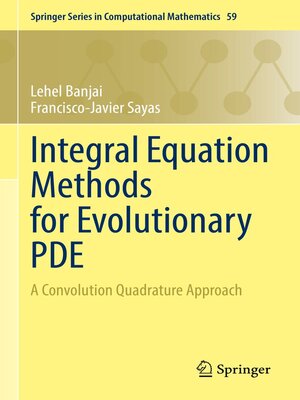Integral Equation Methods for Evolutionary PDE
ebook ∣ A Convolution Quadrature Approach · Springer Series in Computational Mathematics
By Lehel Banjai

Sign up to save your library
With an OverDrive account, you can save your favorite libraries for at-a-glance information about availability. Find out more about OverDrive accounts.
Find this title in Libby, the library reading app by OverDrive.



Search for a digital library with this title
Title found at these libraries:
| Library Name | Distance |
|---|---|
| Loading... |
This book provides a comprehensive analysis of time domain boundary integral equations and their discretisation by convolution quadrature and the boundary element method.
Properties of convolution quadrature, based on both linear multistep and Runge–Kutta methods, are explained in detail, always with wave propagation problems in mind. Main algorithms for implementing the discrete schemes are described and illustrated by short Matlab codes; translation to other languages can be found on the accompanying GitHub page. The codes are used to present numerous numerical examples to give the reader a feeling for the qualitative behaviour of the discrete schemes in practice. Applications to acoustic and electromagnetic scattering are described with an emphasis on the acoustic case where the fully discrete schemes for sound-soft and sound-hard scattering are developed and analysed in detail. A strength of the book is that more advanced applications such as linear and non-linear impedance boundary conditions and FEM/BEM coupling are also covered. While the focus is on wave scattering, a chapter on parabolic problems is included which also covers the relevant fast and oblivious algorithms. Finally, a brief description of data sparse techniques and modified convolution quadrature methods completes the book.
Suitable for graduate students and above, this book is essentially self-contained, with background in mathematical analysis listed in the appendix along with other useful facts. Although not strictly necessary, some familiarity with boundary integral equations for steady state problems is desirable.
Properties of convolution quadrature, based on both linear multistep and Runge–Kutta methods, are explained in detail, always with wave propagation problems in mind. Main algorithms for implementing the discrete schemes are described and illustrated by short Matlab codes; translation to other languages can be found on the accompanying GitHub page. The codes are used to present numerous numerical examples to give the reader a feeling for the qualitative behaviour of the discrete schemes in practice. Applications to acoustic and electromagnetic scattering are described with an emphasis on the acoustic case where the fully discrete schemes for sound-soft and sound-hard scattering are developed and analysed in detail. A strength of the book is that more advanced applications such as linear and non-linear impedance boundary conditions and FEM/BEM coupling are also covered. While the focus is on wave scattering, a chapter on parabolic problems is included which also covers the relevant fast and oblivious algorithms. Finally, a brief description of data sparse techniques and modified convolution quadrature methods completes the book.
Suitable for graduate students and above, this book is essentially self-contained, with background in mathematical analysis listed in the appendix along with other useful facts. Although not strictly necessary, some familiarity with boundary integral equations for steady state problems is desirable.







